★★
“An uphill slog.”
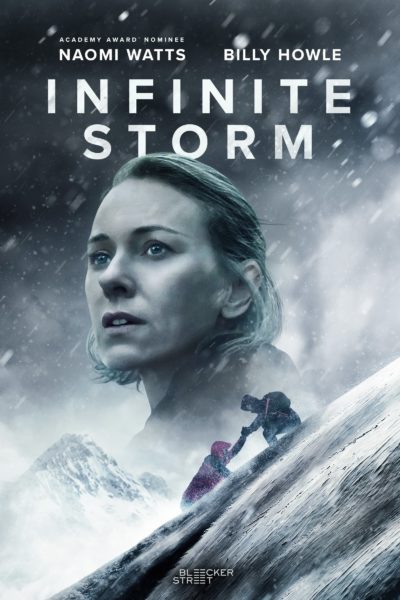 The “based on a true story” label covers a broad range of cinematic outcomes. However, a general rule of thumb is, the closer a movie stays to the facts, the less interesting the result will be. On that basis, I suspect this is a true and accurate deduction of the life of Pam Bales, and one particular incident therein. Because it’s largely lacking in excitement, and worse, seems to know it. Unless you have a fondness for watching someone trudge uphill for 30 minutes, then downhill for another sixty, I’d recommend giving this a pass. Despite some attractive scenery (Slovenia standing in for New Hampshire), there’s not enough to generate the necessary amount of drama or tension.
The “based on a true story” label covers a broad range of cinematic outcomes. However, a general rule of thumb is, the closer a movie stays to the facts, the less interesting the result will be. On that basis, I suspect this is a true and accurate deduction of the life of Pam Bales, and one particular incident therein. Because it’s largely lacking in excitement, and worse, seems to know it. Unless you have a fondness for watching someone trudge uphill for 30 minutes, then downhill for another sixty, I’d recommend giving this a pass. Despite some attractive scenery (Slovenia standing in for New Hampshire), there’s not enough to generate the necessary amount of drama or tension.
Pam (Watts) heads out on a solo hike of Mt. Washington. While she’s an experienced hiker, and a member of the local volunteer search and rescue team, she is still not prepared for the sudden change in weather conditions that descends, engulfing her in a blizzard. Managing to extricate herself from a crevasse into which she falls, she then stumbles across another hiker (Howle), ill-outfitted for the storm, just sitting in the middle of the trail. She has to try and negotiate a way down and off the mountain for both of them, a task made harder by her new charge’s odd aversion to being rescued. He won’t tell her his actual name, forcing her to call him John by default, and at one point deliberately plunges off a precipice.
There does turn out to be a reason for this suicidal behavior, which is fair enough. Less satisfactory, is the script’s decision to give us a back-story about Pam and her children. It feels as if they think simple heroism is not something a person – in particular a woman – can simply have; there has to be some more or less buried trauma in their past, to justify their bravery. I didn’t feel this added anything of real significance to her character – and worse, I didn’t care and, to be honest, found it kinda dull. It’s as if the makers didn’t have faith in the ability of their core story to hold the viewer’s attention. Sadly, I can’t argue with them on that point.
In particular, it doesn’t offer any particular progression. This is just Pam stumbling her way about, against the environment and the elements for an hour and a half. At the end, there’s a particularly “Eh?” moment, where a caption informs us that it only takes one person to change a life, not long after Pam has declared that the universe is an infinite storm of beauty. I’m not sure how the film got there from what it depicted over the previous ninety minutes. I always say that the vastly overrated 2001, is the only journey to the outer planets, which feels like it was filmed in real-time. Along the same lines, Infinite Storm is the only mountain climbing movie I’ve seem, which feels like it was filmed in real-time
Dir: Malgorzata Szumowska
Star: Naomi Watts, Billy Howle, Denis O’Hare, Parker Sawyers





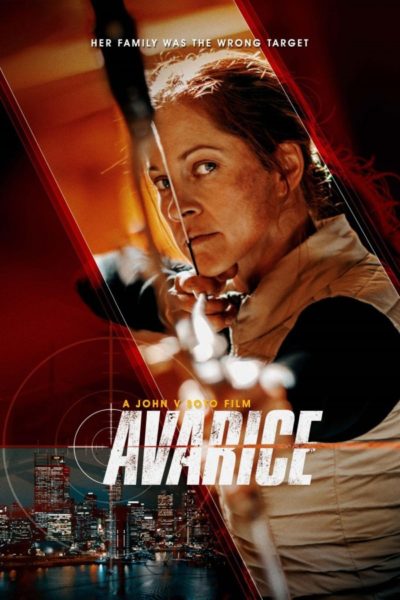 I’m not 100% sure, but I suspect this may be the first film I’ve tagged as both in the “sport” and “home invasion” genres. It’s not a crossover you see every day. However, it is fair comment in this case, even if takes its own sweet time to get there. Kate Matthews (Alexy) has various bits of static in her life. Her husband, Ash (Ford), spends too much time at his Very Important job in high finance, rather than on their relationship. Daughter Susan is being a teenager. Kate just lost an archery tournament. Oh, and their house has been invaded by Reed (Nell) and her band of thugs, who are now intent on forcing Ash to transfer thirty million dollars into their offshore bank-accounts.
I’m not 100% sure, but I suspect this may be the first film I’ve tagged as both in the “sport” and “home invasion” genres. It’s not a crossover you see every day. However, it is fair comment in this case, even if takes its own sweet time to get there. Kate Matthews (Alexy) has various bits of static in her life. Her husband, Ash (Ford), spends too much time at his Very Important job in high finance, rather than on their relationship. Daughter Susan is being a teenager. Kate just lost an archery tournament. Oh, and their house has been invaded by Reed (Nell) and her band of thugs, who are now intent on forcing Ash to transfer thirty million dollars into their offshore bank-accounts.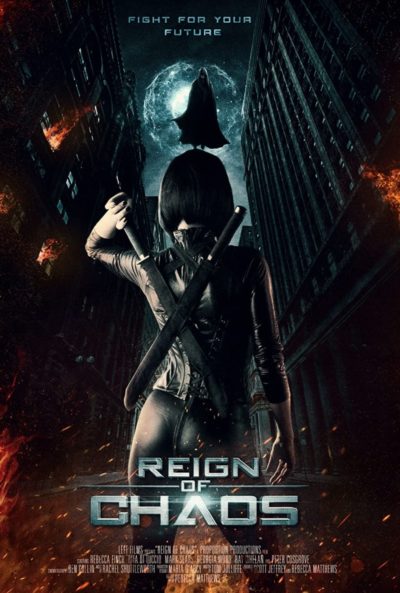 There are spells where I find myself going through a stream of mediocre movies, wondering when I’ll see something genuinely good. Then, I stumble into the likes of this, which leaves me yearning for the heady delights of mediocrity. It was in trouble right from the start, with five minutes of opening voice-over that did nothing but leave me confused. Then again, if your story requires five minutes of opening voice-over in the first place, you should probably rethink your storytelling techniques. The same could be said for a post-apocalyptic scenario in which food is in short supply, yet black pleather cat-suits are apparently easily available, in a range of sizes to fit all needs.
There are spells where I find myself going through a stream of mediocre movies, wondering when I’ll see something genuinely good. Then, I stumble into the likes of this, which leaves me yearning for the heady delights of mediocrity. It was in trouble right from the start, with five minutes of opening voice-over that did nothing but leave me confused. Then again, if your story requires five minutes of opening voice-over in the first place, you should probably rethink your storytelling techniques. The same could be said for a post-apocalyptic scenario in which food is in short supply, yet black pleather cat-suits are apparently easily available, in a range of sizes to fit all needs.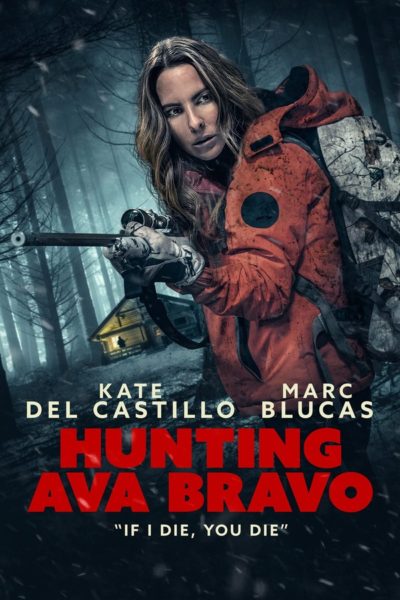 I do admire a film which does not hang about, and this certainly qualifies. We begin with Ava Bravo (del Castillo) removing a hood to find herself in a very remote, snowbound mountain cabin. A cassette player nearby has a message. She has been abducted by Buddy King (Blucas), a millionaire with a fondness for kidnapping trauma survivors and hunting them through the wilderness. There’s a snowmobile parked five miles North, if she can make it across the winter terrain there. To make it fairer, Buddy has only three bullets for his gun. Oh, and he’s going to be coming up from the basement in ten seconds. Safe to say, this is the kind of start that grabbed my attention.
I do admire a film which does not hang about, and this certainly qualifies. We begin with Ava Bravo (del Castillo) removing a hood to find herself in a very remote, snowbound mountain cabin. A cassette player nearby has a message. She has been abducted by Buddy King (Blucas), a millionaire with a fondness for kidnapping trauma survivors and hunting them through the wilderness. There’s a snowmobile parked five miles North, if she can make it across the winter terrain there. To make it fairer, Buddy has only three bullets for his gun. Oh, and he’s going to be coming up from the basement in ten seconds. Safe to say, this is the kind of start that grabbed my attention.  For six months or so, our morning routine involved the consumption of an episode of Parks and Recreation with breakfast. Our favourite character on the show was Ron Swanson, but not far behind was April Ludgate, played by Aubrey Plaza. She was the mistress of deadpan misanthropy, delivering lines like “I’m just gonna live under a bridge and ask people riddles before they cross.” We’ve not seen her in much since the show ended, but the concept of April Ludgate, career criminal, was too delicious to pass up. So here we are, yet I must admit, Plaza is almost good enough to make us forget April. Well, except for one roll of the eyes, which was vintage Ludgate.
For six months or so, our morning routine involved the consumption of an episode of Parks and Recreation with breakfast. Our favourite character on the show was Ron Swanson, but not far behind was April Ludgate, played by Aubrey Plaza. She was the mistress of deadpan misanthropy, delivering lines like “I’m just gonna live under a bridge and ask people riddles before they cross.” We’ve not seen her in much since the show ended, but the concept of April Ludgate, career criminal, was too delicious to pass up. So here we are, yet I must admit, Plaza is almost good enough to make us forget April. Well, except for one roll of the eyes, which was vintage Ludgate.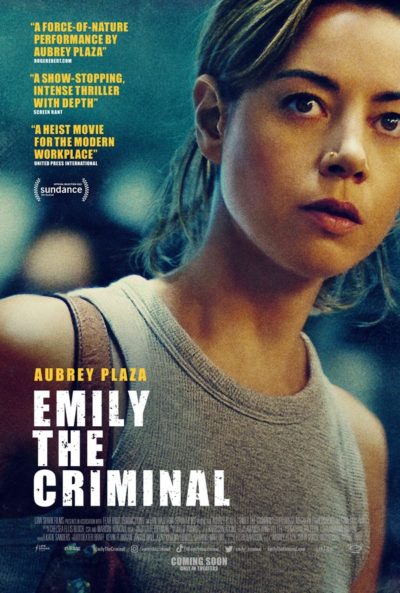 She plays Emily, a young woman saddled with an inescapable pit of student loans, for a basically useless qualification, and an unfortunate felony relegating her to food delivery work. A chance encounter brings her into contact with Youcef (Rossi). She earns $200 for making a fraudulent credit-card transaction on his behalf, and is offered the chance to earn ten times that, for a larger, riskier purchase. With regular employment clearly not the solution, Emily embraces her new, illegal career, working with Youcef, much to the disdain of his Lebanese brothers. As their infighting escalates, Youcef decides to cut and run, only to be beaten to the punch. Emily won’t stand for that: “You’re a bad influence,” says Youcef, as he and Emily prepare to rob his brother. He’s not wrong.
She plays Emily, a young woman saddled with an inescapable pit of student loans, for a basically useless qualification, and an unfortunate felony relegating her to food delivery work. A chance encounter brings her into contact with Youcef (Rossi). She earns $200 for making a fraudulent credit-card transaction on his behalf, and is offered the chance to earn ten times that, for a larger, riskier purchase. With regular employment clearly not the solution, Emily embraces her new, illegal career, working with Youcef, much to the disdain of his Lebanese brothers. As their infighting escalates, Youcef decides to cut and run, only to be beaten to the punch. Emily won’t stand for that: “You’re a bad influence,” says Youcef, as he and Emily prepare to rob his brother. He’s not wrong. 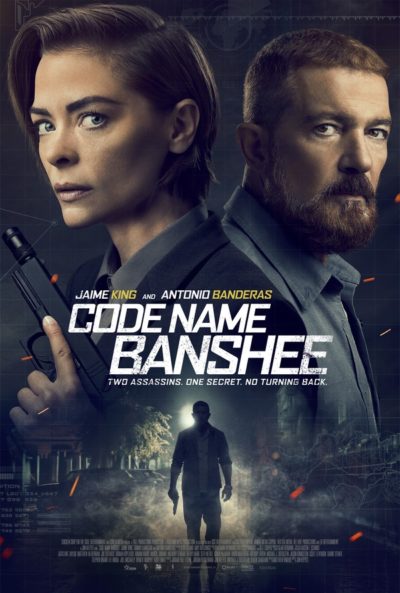 This seemed considerably better in the trailer, which makes it look like quite an action-packed extravaganza. The reality is much less interesting, with a murky and confusing plot, and what action there is, is often filmed in a murky and confusing way. It begins with an agent, code name Banshee (King), quitting the government agency for which she works. The handoff of an asset went wrong: one of the colleagues involved was her father, who vanished entirely. The other was Caleb (Banderas), who went off the grid thereafter. Five years later, Banshee is a private assassin, but her latest job is interrupted by Greene (Flanagan), who wants her to give up Caleb’s location.
This seemed considerably better in the trailer, which makes it look like quite an action-packed extravaganza. The reality is much less interesting, with a murky and confusing plot, and what action there is, is often filmed in a murky and confusing way. It begins with an agent, code name Banshee (King), quitting the government agency for which she works. The handoff of an asset went wrong: one of the colleagues involved was her father, who vanished entirely. The other was Caleb (Banderas), who went off the grid thereafter. Five years later, Banshee is a private assassin, but her latest job is interrupted by Greene (Flanagan), who wants her to give up Caleb’s location.  A disease sweeps the planet, killing billions. The only ones with any hope of surviving in the outside world are the young, a small number of whom appear to have a natural immunity. Five years on, and Ellie is one of the few to have endured, scraping for a life among the leftovers of civilization. But she and the other survivors are the targets for the Stalkers: roaming groups of biohazard-suit clad hunters in white vans. They seek to capture the immune, for use in a project to develop a vaccine that can allow the elite to come out of their safe havens. While trying to avoid them, she encounters Quinn (Smith), another survivor with a wealth of knowledge, and a hard-edged approach to life. Initially, Quinn wants nothing to do with Ellie, though eventually realizes two heads can sometimes be better than one, in the never ending struggle to stay alive and free.
A disease sweeps the planet, killing billions. The only ones with any hope of surviving in the outside world are the young, a small number of whom appear to have a natural immunity. Five years on, and Ellie is one of the few to have endured, scraping for a life among the leftovers of civilization. But she and the other survivors are the targets for the Stalkers: roaming groups of biohazard-suit clad hunters in white vans. They seek to capture the immune, for use in a project to develop a vaccine that can allow the elite to come out of their safe havens. While trying to avoid them, she encounters Quinn (Smith), another survivor with a wealth of knowledge, and a hard-edged approach to life. Initially, Quinn wants nothing to do with Ellie, though eventually realizes two heads can sometimes be better than one, in the never ending struggle to stay alive and free.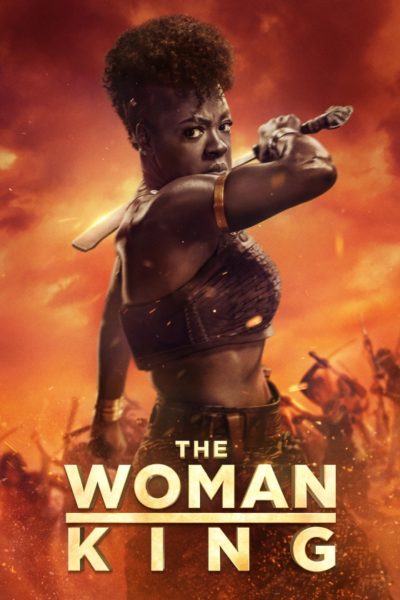 The above – though expressed rather more bluntly! – was Chris’s reaction to the opening scene, in which Nanisca (Davis) leads her female troops, the Agojie, in the ambush of slavers from the neighbouring Oyo tribe. The Oyo are rivals to the Kingdom of Dahomey, under King Ghezo (John Boyega), who relies on Nanisca and the Agojie to protect his territory, and it’s getting closer to all-out war. The Agojie get a new recruit, Nawi (Mbedu), whose father drops her off at the palace gate, because of her refusal to accept an arranged marriage. Nawi turns out to have a very close connection to Nanisca, but also ends up captured by the Oyo and needs to escape before being sold to Brazilian slavers.
The above – though expressed rather more bluntly! – was Chris’s reaction to the opening scene, in which Nanisca (Davis) leads her female troops, the Agojie, in the ambush of slavers from the neighbouring Oyo tribe. The Oyo are rivals to the Kingdom of Dahomey, under King Ghezo (John Boyega), who relies on Nanisca and the Agojie to protect his territory, and it’s getting closer to all-out war. The Agojie get a new recruit, Nawi (Mbedu), whose father drops her off at the palace gate, because of her refusal to accept an arranged marriage. Nawi turns out to have a very close connection to Nanisca, but also ends up captured by the Oyo and needs to escape before being sold to Brazilian slavers.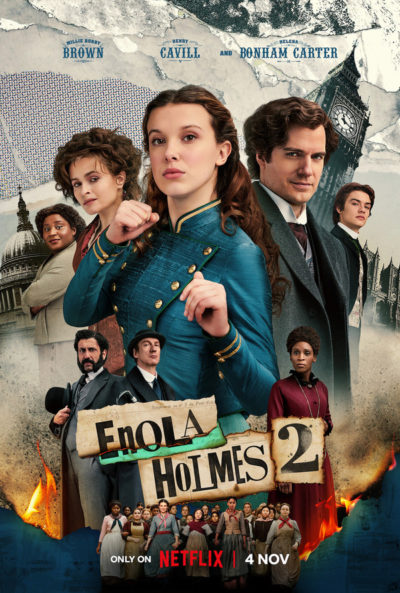 I had forgotten how much I really did not like the
I had forgotten how much I really did not like the 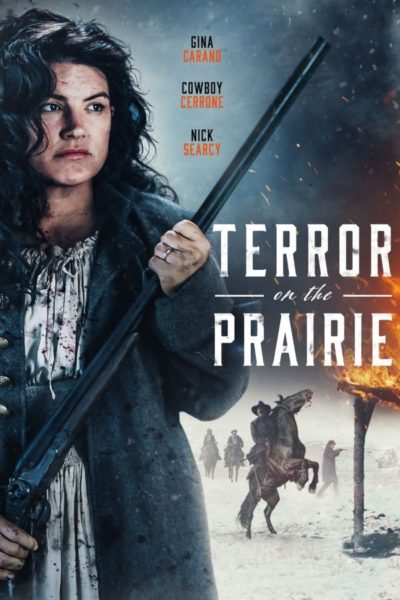 I keep hoping Carano will deliver an action film reaching the quality of her debut,
I keep hoping Carano will deliver an action film reaching the quality of her debut,